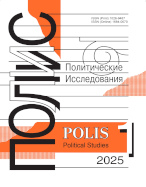Transcellular Structures as Form of Construction and Source of Self-Development of the State
Solovyov A.I.,
Dr. Sci. (Pol. Sci.), Prof., Head of Political Analysis Department, Faculty of Public Administration, Lomonosov Moscow State University. Moscow, Russia, solovyev@spa.msu.ru
elibrary_id: 75920 |
DOI: 10.17976/jpps/2006.06.05
Solovyov A.I. Transcellular Structures as Form of Construction and Source of Self-Development of the State . – Polis. Political Studies. 2006. No. 6. https://doi.org/10.17976/jpps/2006.06.05
In the article, the author proposes and substantiates the model of transcellular construction of the state. He demonstrates that stable intercourse of those invested with state authority and governing powers transforms their normative-organizational links into relations of particular structures – communicative cells. The cells metaphor reflects the existence of those non-balanced, context-seizing complexes of relations of agents of the state, which (complexes) tend to arise – and do arise – over the formal-hierarchical, “prescribed” links. It is these transcellular contacts that form the real construction of the state, its morphological structure, allowing it to maintain order and stability of joint life in the concrete-historical and situational context. In this sense the outline of the communicative fields is at the same time also the institutional outline of the state. According to the author’s conclusion, it is exactly the cellular “bodies” of practical intercourse that constitute the grounds of morphology of the state whose make-up depends on which agents (counter-agents) have managed to impose the type of communication, preferential for themselves, on their partners.
See also:
Sorokin K.E.,
Russia and the Play of Geopolitical Interests in the Great Ocean Area. – Polis. Political Studies. 1994. No4
Barsukova S.Yu.,
Problems of Refugees and Emergency Migrants in the Mirror of Ideologies. – Polis. Political Studies. 1999. No5
Pastukhov V.B.,
From Statehood to the State: Europe and Russia. – Polis. Political Studies. 1994. No2
Laslo E. ,
Birth of a World - Birth of a Science - Birth of an Age. – Polis. Political Studies. 1993. No2
Pshizova S.N.,
Democracy and Political Market in a Comparative Perspective (II). – Polis. Political Studies. 2000. No3





.jpg)






 print
print
.jpg)
.jpg)